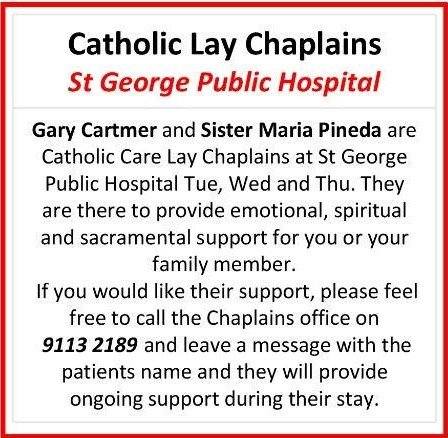 St. Patrick's Catholic Church, Kogarah
St. Patrick's Catholic Church, Kogarah
 Welcome To St. Patrick's Catholic Church Kogarah
Welcome To St. Patrick's Catholic Church Kogarah
-
-
MASS TIMESSunday Mass
Saturday (Vigil) 5:30pm
Sunday 8am, 10am, 6:30pmHOLY DAYS OF OBLIGATION* AUSTRALIA15 August - Assumption of the Blessed Virgin Mary8:15am, 6pm25 December - ChristmasDaily MassAdditional 8:15am or 6pm Mass on special feast/solemnity/saint's dayTuesday, Thursday, Friday, Saturday 8:15amWednesday 6pm Our Lady of Perpetual Help Novena, 6:30pm Mass, Cenacle Prayer, AdorationAll Night Prayer Vigil1st Friday-Saturday4-5 July 20251-2 August 2025Starts Friday 7pm, 7:30pm Holy Mass, Saturday 12:30am Holy MassHealing Mass/Anointing of the Sick1st Saturday 8:15amEUCHARISTIC ADORATION
Tue, Thu, Fri, Sat 7:15am-8:15amTue-Fri 8pm-9pmCONFESSIONS
Sat 8:45am-9:15am, 5pm-5:25pmon request, before/after weekday Mass*The Sunday obligation2180 The precept of the Church specifies the law of the Lord more precisely: "On Sundays and other holy days of obligation the faithful are bound to participate in the Mass." "The precept of participating in the Mass is satisfied by assistance at a Mass which is celebrated anywhere in a Catholic rite either on the holy day or on the evening of the preceding day."A day of grace and rest from work.2185 On Sundays and other holy days of obligation, the faithful are to refrain from engaging in work or activities that hinder the worship owed to God, the joy proper to the Lord's Day, the performance of the works of mercy, and the appropriate relaxation of mind and body. Family needs or important social service can legitimately excuse from the obligation of Sunday rest. The faithful should see to it that legitimate excuses do not lead to habits prejudicial to religion, family life, and health.The charity of truth seeks holy leisure - the necessity of charity accepts just work.1) You must be in a state of grace. CCC 14152) You must have been to confession since your last mortal sin. Can. 9163) You must believe in the doctrine of transubstantiation. CCC 14134) You must observe the Eucharistic fast. Can. 9195) You must not be under an ecclesiastical censure. Can. 915It is normally impossible for non-Catholic Christians to receive Holy Communion, for to do so would be to proclaim a unity to exist that, regrettably, does not. Another reason that many non-Catholics may not ordinarily receive Communion is for their own protection, since many reject the doctrine of the Real Presence of Christ in the Eucharist. Scripture warns that it is very dangerous for one not believing in the Real Presence to receive Communion: “For any one who eats and drinks without discerning the body eats and drinks judgment upon himself” (1 Cor. 11:29). -
For more updated information and notices please see our Parish Notices and the Archdiocese of Sydney website.
Please see our bulletin and information posters inside the Church or on our 2 Notice Boards.Please contact us by email or phone 02 9587 8064 Tues 9am-2pm. -
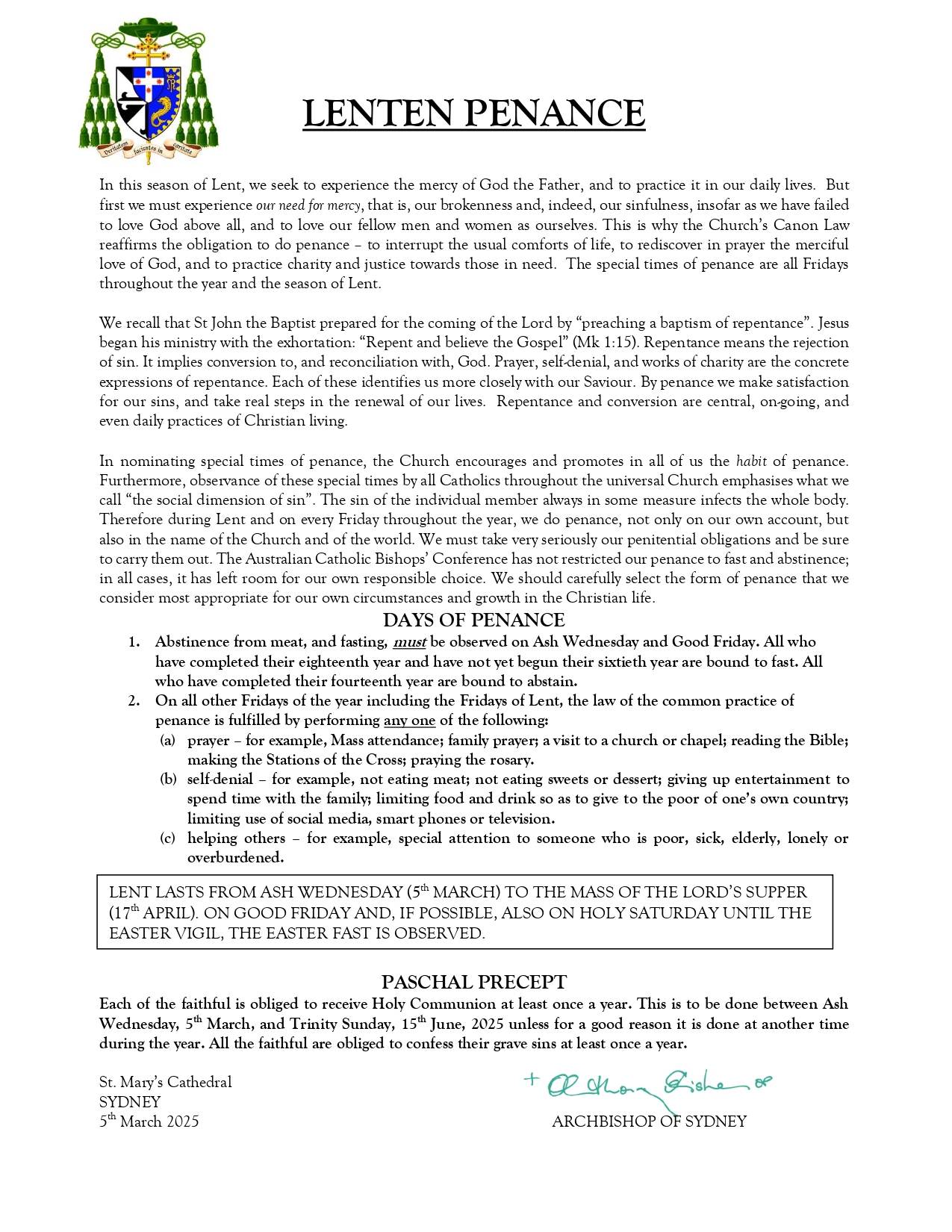
-
II. THE PRECEPTS OF THE CHURCH
2041 The precepts of the Church are set in the context of a moral life bound to and nourished by liturgical life. The obligatory character of these positive laws decreed by the pastoral authorities is meant to guarantee to the faithful the very necessary minimum in the spirit of prayer and moral effort, in the growth in love of God and neighbor:
2042 The first precept ("You shall attend Mass on Sundays and holy days of obligation and rest from servile labor") requires the faithful to sanctify the day commemorating the Resurrection of the Lord as well as the principal liturgical feasts honoring the mysteries of the Lord, the Blessed Virgin Mary, and the saints; in the first place, by participating in the Eucharistic celebration, in which the Christian community is gathered, and by resting from those works and activities which could impede such a sanctification of these days.
The second precept ("You shall confess your sins at least once a year") ensures preparation for the Eucharist by the reception of the sacrament of reconciliation, which continues Baptism's work of conversion and forgiveness.
The third precept ("You shall receive the sacrament of the Eucharist at least during the Easter season") guarantees as a minimum the reception of the Lord's Body and Blood in connection with the Paschal feasts, the origin and center of the Christian liturgy.
2043 The fourth precept ("You shall observe the days of fasting and abstinence established by the Church") ensures the times of ascesis and penance which prepare us for the liturgical feasts and help us acquire mastery over our instincts and freedom of heart.
The fifth precept ("You shall help to provide for the needs of the Church") means that the faithful are obliged to assist with the material needs of the Church, each according to his own ability.
The faithful also have the duty of providing for the material needs of the Church, each according to his own abilities.
-
The Easter Triduum begins with the Vigil of Holy Thursday. It marks the end of the forty days of Lent and the beginning of the three-day celebration of the death and resurrection of Jesus Christ - Holy Thursday, 17 April, Good Friday, 18 April and Easter Vigil/Easter Sunday, 19/20 April. The Fathers of the Second Vatican Council reminded us of the extraordinary significance of the Triduum : "Christ redeemed us all and gave perfect glory to God principally through his paschal mystery: dying he destroyed our death and rising he restored our life. Therefore the Easter Triduum of the passion and resurrection of Christ is the culmination of the entire liturgical year." (General Norms for the Liturgical Year and the Calendar, # 18)The Catechism of the Catholic Church instructs us: "Beginning with the Easter Triduum as its source of light, the new age of the Resurrection fills the whole liturgical year with its brilliance. Gradually, on either side of this source, the year is transfigured by the liturgy. It really is a "year of the Lord's favor." The economy of salvation is at work within the framework of time, but since its fulfillment in the Passover of Jesus and the outpouring of the Holy Spirit, the culmination of history is anticipated "as a foretaste," and the kingdom of God enters into our time."Therefore Easter is not simply one feast among others, but the "Feast of feasts," the "Solemnity of solemnities," just as the Eucharist is the "Sacrament of sacraments" (the Great Sacrament). St. Athanasius calls Easter "the Great Sunday" and the Eastern Churches call Holy Week "the Great Week." The mystery of the Resurrection, in which Christ crushed death, permeates with its powerful energy our old time, until all is subjected to him." (CCC # 1168, 1169)
-
Hail, holy Mother, thou who didst bring forth the King who rules heaven and earth forever and ever.You are all-beautiful, O Mary! You are the glory, you are the joy, you are the honor of our people!An Act of Consecration to the Blessed Virgin MaryHoly Mary, Mother of God and Virgin, I choose thee this day for my queen, patron, and advocate, and firmly resolve and purpose never to abandon thee, never to say or do anything against thee, nor to permit that aught be done by others to dishonor thee. Receive me, then, I conjure thee, as thy perpetual servant; assist me in all my actions, and do not abandon me at the hour of my death. Amen. — St. John BerchmansDevotions to the Mother of GodRegina Coeli (Queen of Heaven), The Rosary, Litany of the Blessed Virgin Mary (Litany of Loretto), The Brown Scapular -- Fr. William G. Most, The "Akathistos" HymnThe Mysteries of the Most Holy RosaryJoyful (Monday / Saturday) 1. The Annunciation, 2. The Visitation, 3. The Nativity, 4. The Presentation, 5. The Finding of Our Lord in the TempleSorrowful (Tuesday / Friday) 1. The Agony in the Garden, 2. The Scourging at the Pillar, 3. The Crowning with Thorns, 4. The Carrying of the Cross, 5. The CrucifixionGlorious (Wednesday / Sunday) 1. The Resurrection, 2. The Ascension, 3. The Descent of the Holy Spirit, 4. The Assumption, 5. The CoronationLuminous (Thursday) 1. The Baptism in the Jordan, 2. The Wedding at Cana, 3. The Proclamation of the Kingdom, 4. The Transfiguration, 5. The Institution of the Eucharist
-
Behold this Heart which has loved men so much, and yet men do not want to love Me in return. Through you My divine Heart wishes to spread its love everywhere on earth."- Jesus to Saint Margaret MarySacred Heart of Jesus, Font of Love and Mercy.An Act of Consecration to the Sacred Heart of JesusMost sweet Jesus, humbly kneeling at Thy feet, we renew the consecration of our family to Thy Divine Heart. Be Thou our King forever! In Thee we have full and entire confidence. May Thy spirit penetrate our thoughts, our desires, our words and our deeds. Bless our undertakings, share in our joys, in our trials, and in our labors. Grant us to know Thee better, to love Thee more, to serve Thee without faltering. Amen.Devotions to the Sacred Heart of Jesus
-
First Holy Communion link https://forms.gle/
81BWStGuYDDRGfGL7 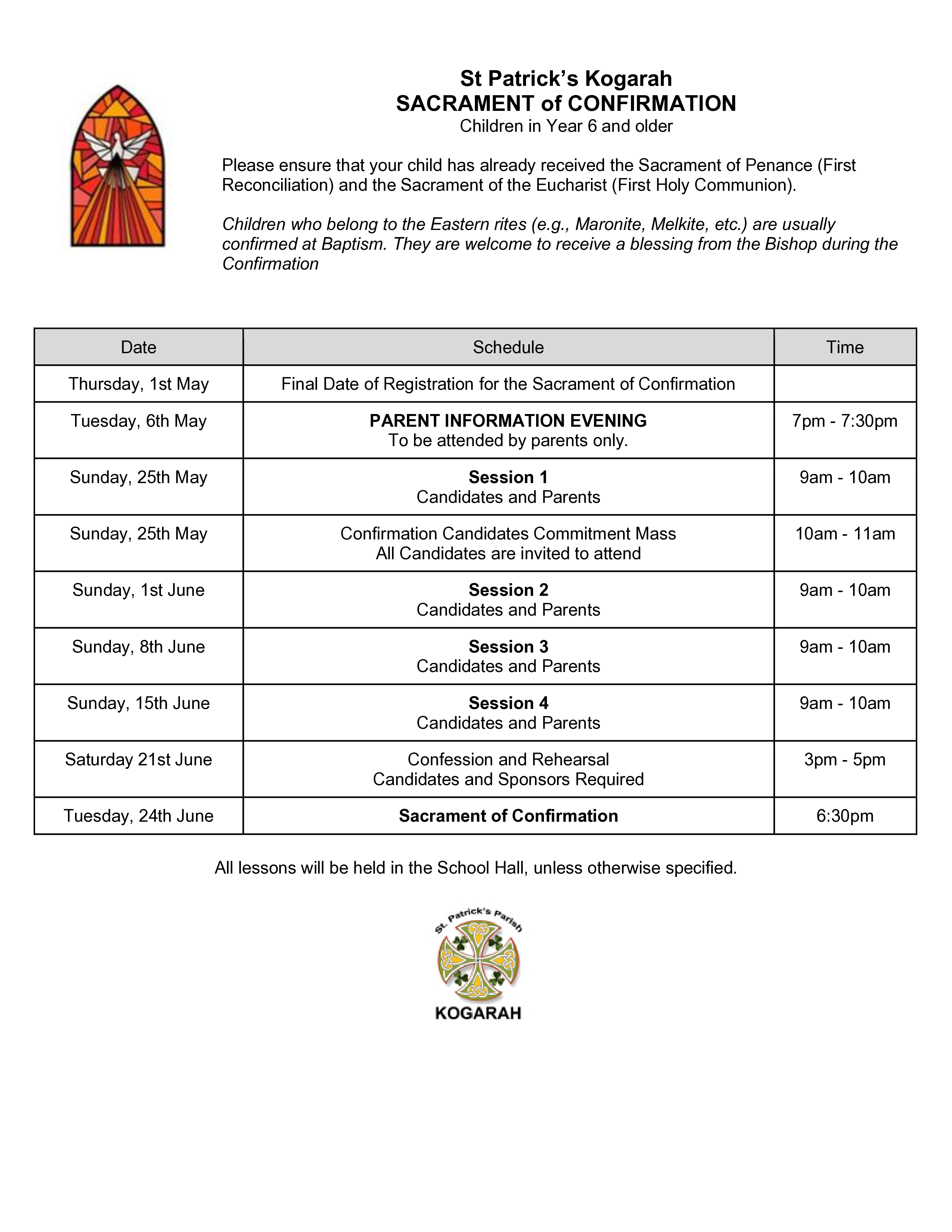
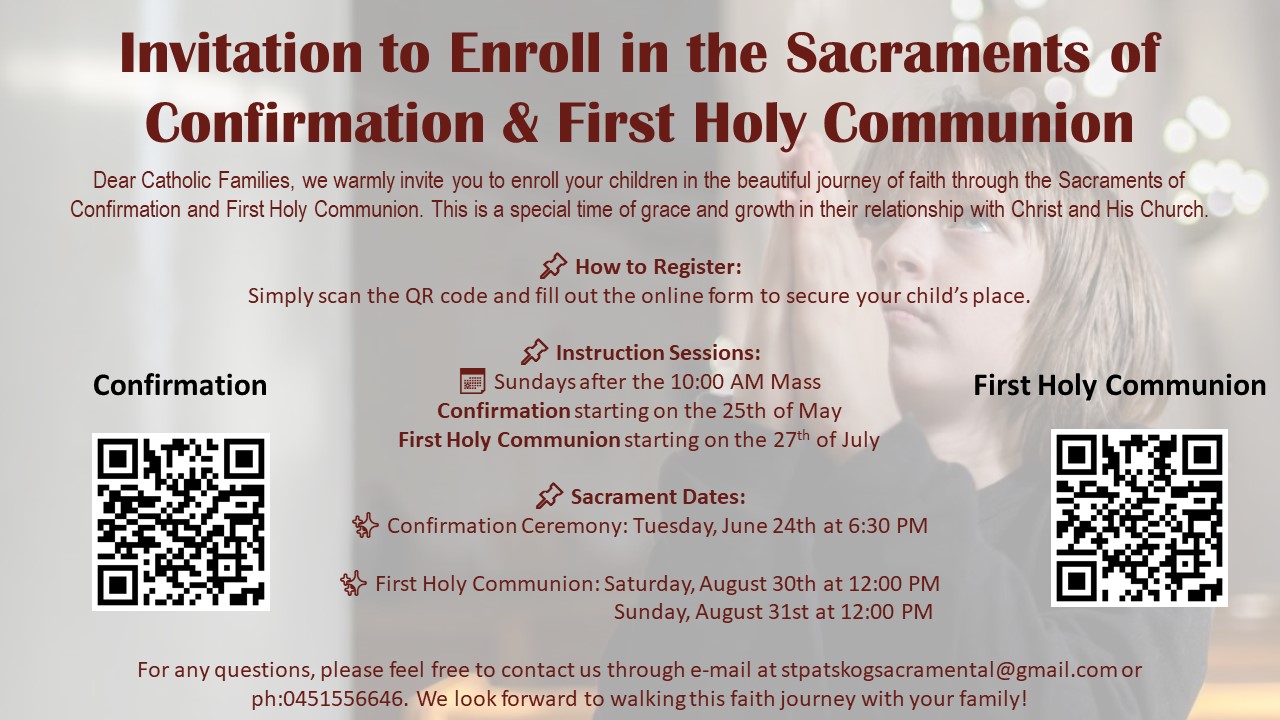
General Information Night
Parish Hall
Thursday, 6 March 2025 @ 6pm
Confirmation
Tuesday, 24 June 2025 @6:30pm
First Holy Communion
Saturday, 30 August 2025 @ 12pm
Sunday, 31 August 2025 @ 12pm
First Reconciliation
Thursday, 20 November 2025
Please contact the Sacramental Coordinator - 0451 556 646, [email protected]
-
36 Chapel StreetKogarah NSW 2217
P: 02 9587 8998 School Email: [email protected] School Website: https://stpatskogarah.syd.catholic.edu.au/St. Patrick's Catholic Primary School is located in the St. George area. It was founded in 1862 and was originally staffed by lay teachers. The Sisters of St. Joseph provided the ministry for the school from the early 1900's until 1986. Since this time, lay leadership has been under the direction of the Catholic Education Office, Sydney. -
Attention: Visitors to this websitePLEASE DO NOT CREATE A NEW USER ACCOUNT.All users can browse all parts of this site without needing an account.There is currently no active/interactive features - place to share information, share photos, chat.Your request will not be actioned and/or it will be denied.Please contact the Parish Office (currently only open on a Tuesday 9am-2pm).By Email: [email protected] or Phone: +61 2 9587 8064. Thank you.
-

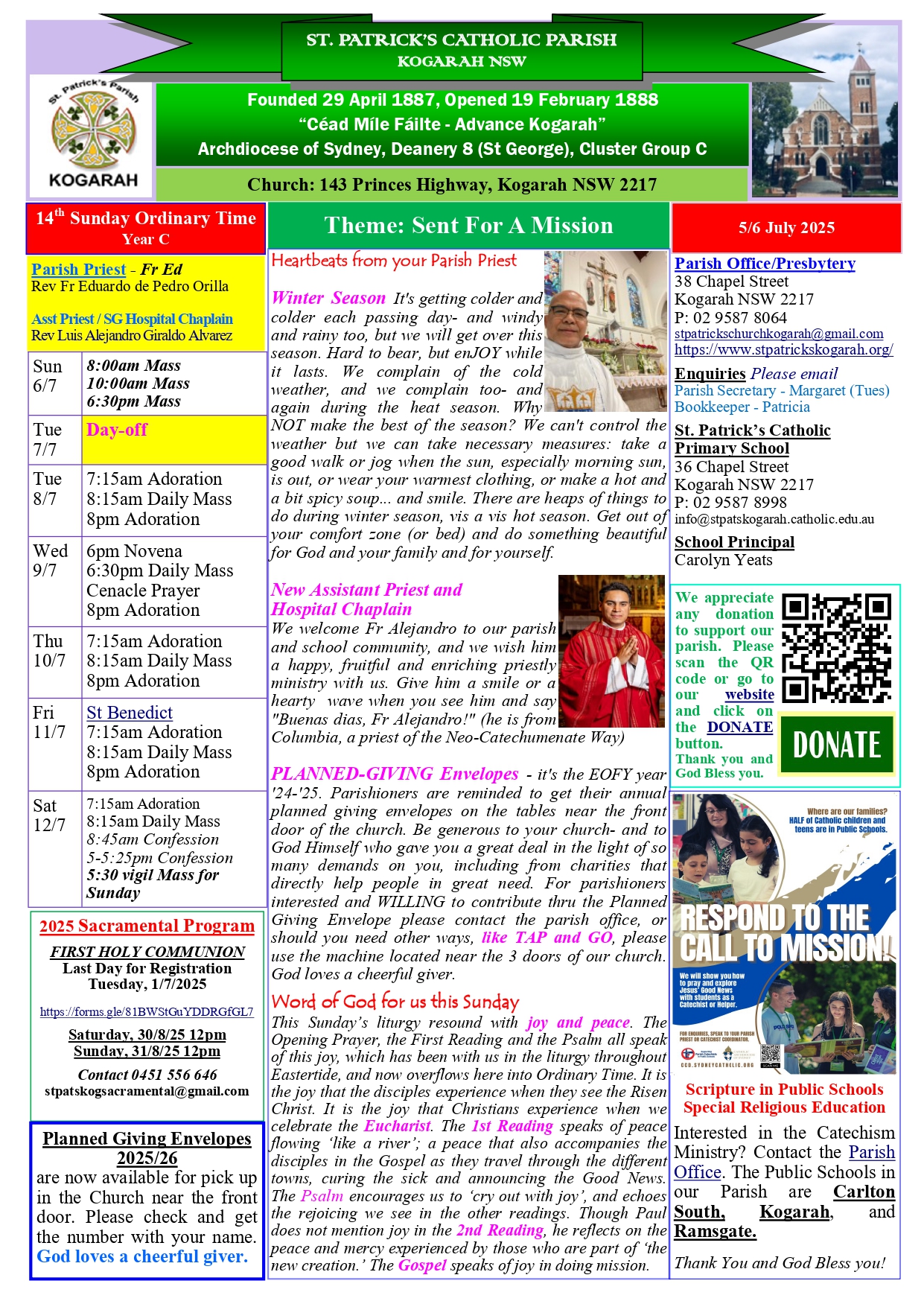
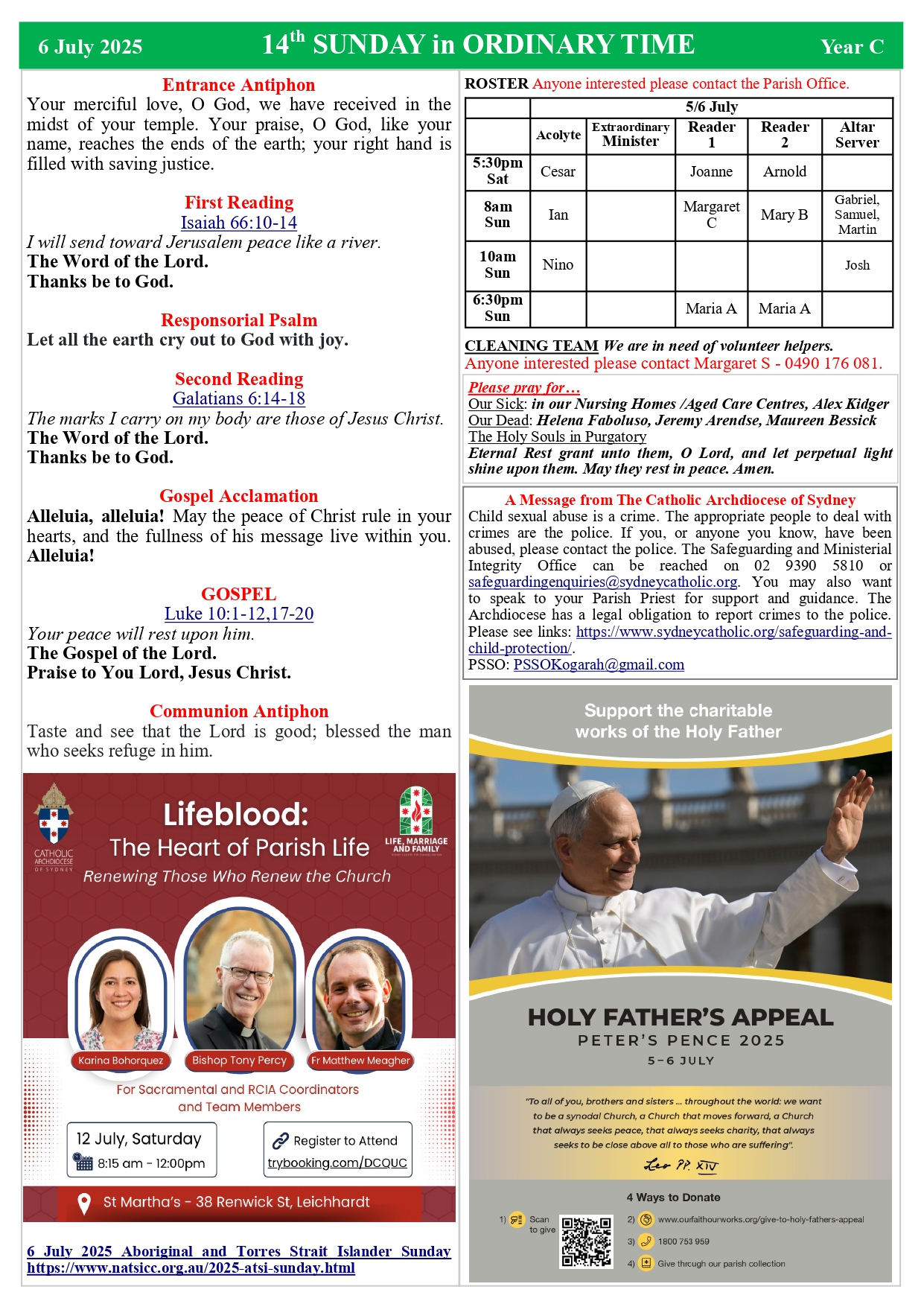
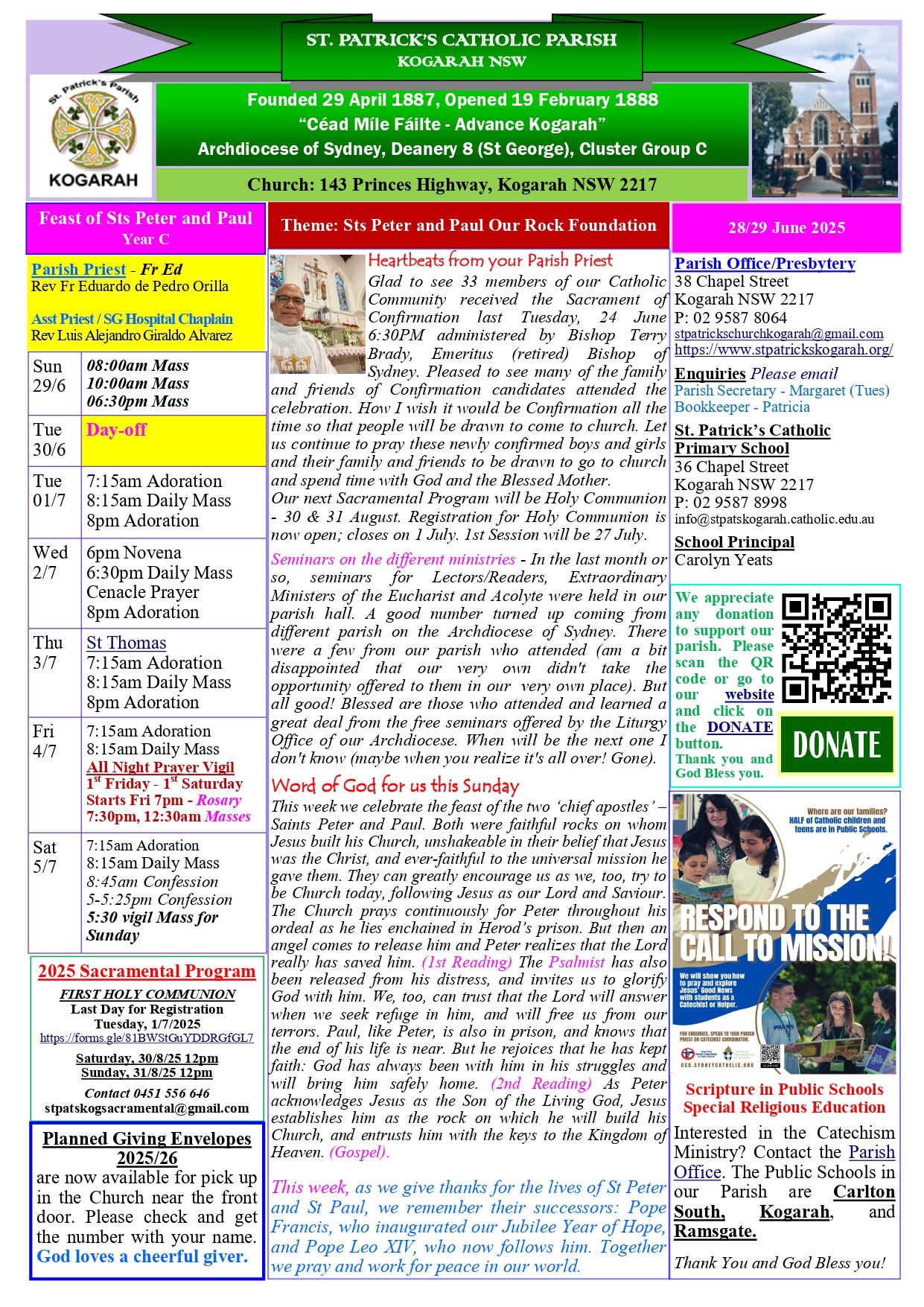
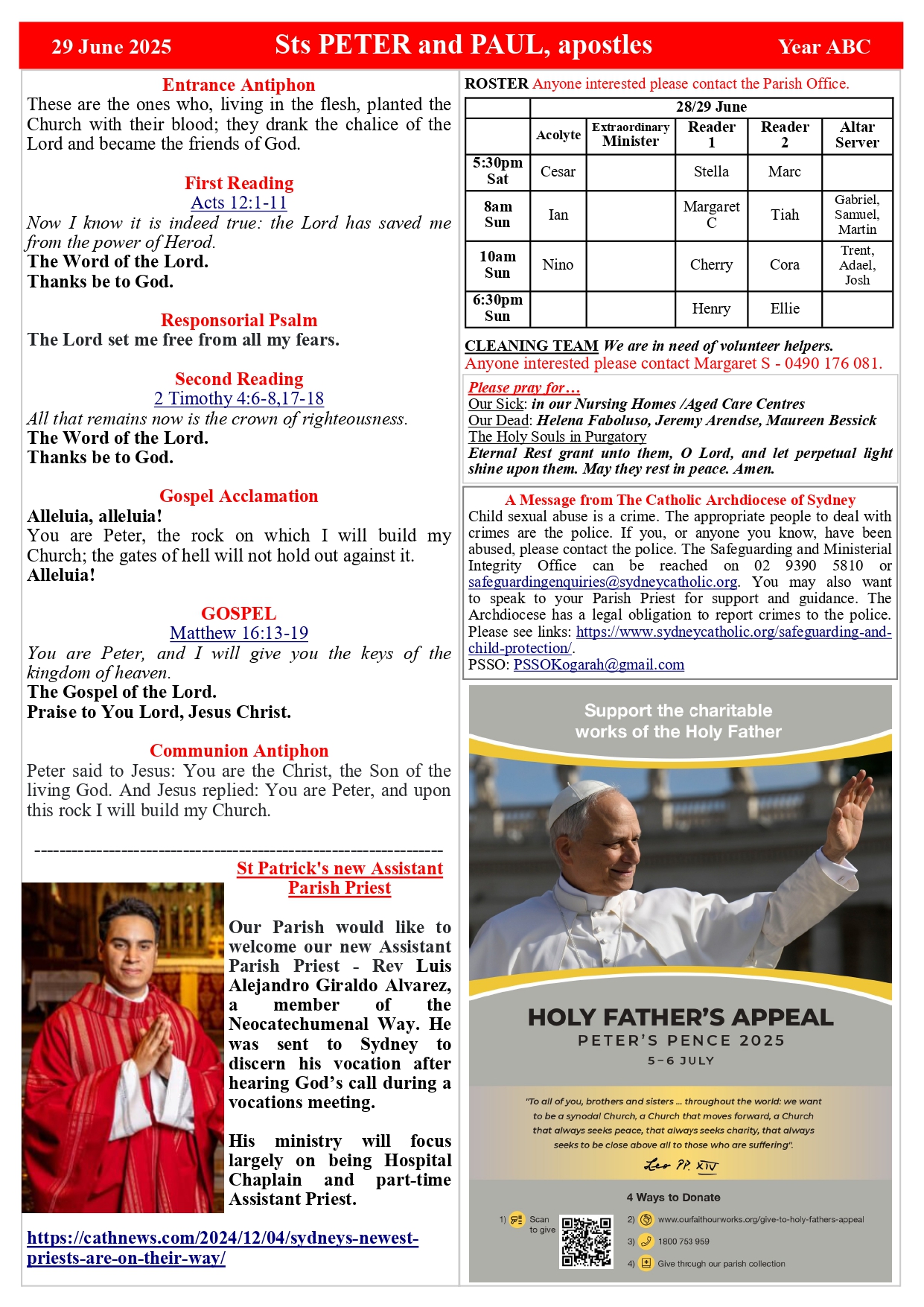



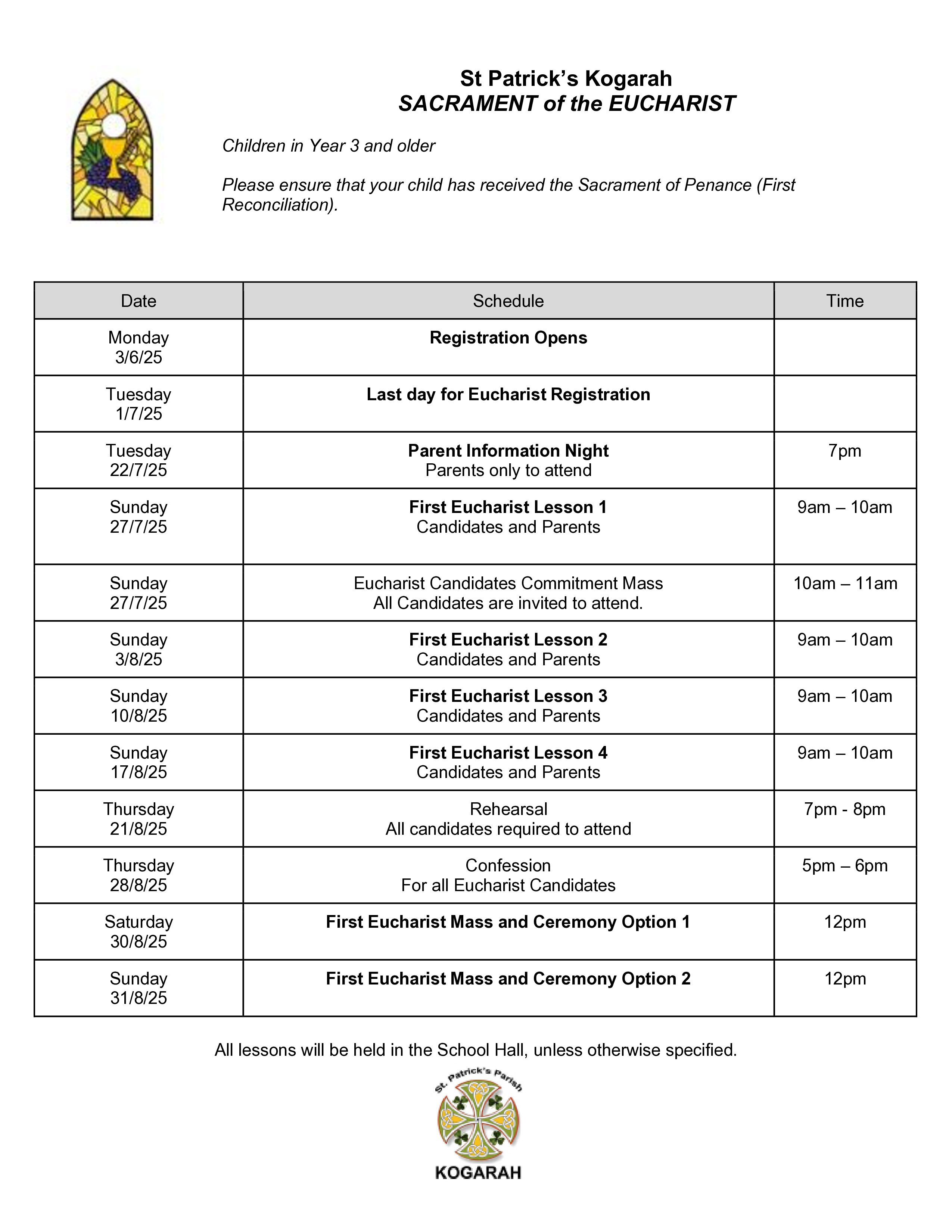

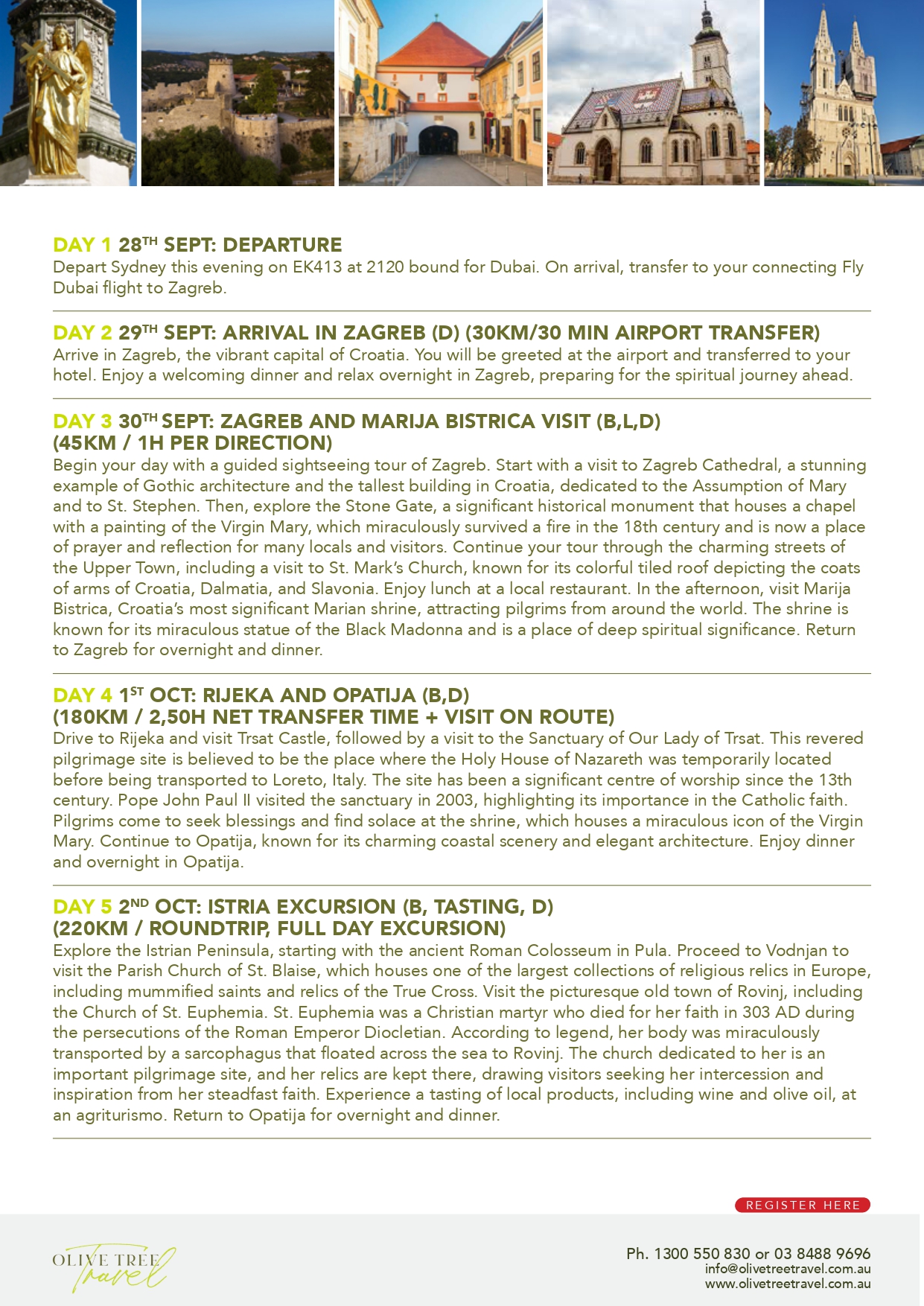
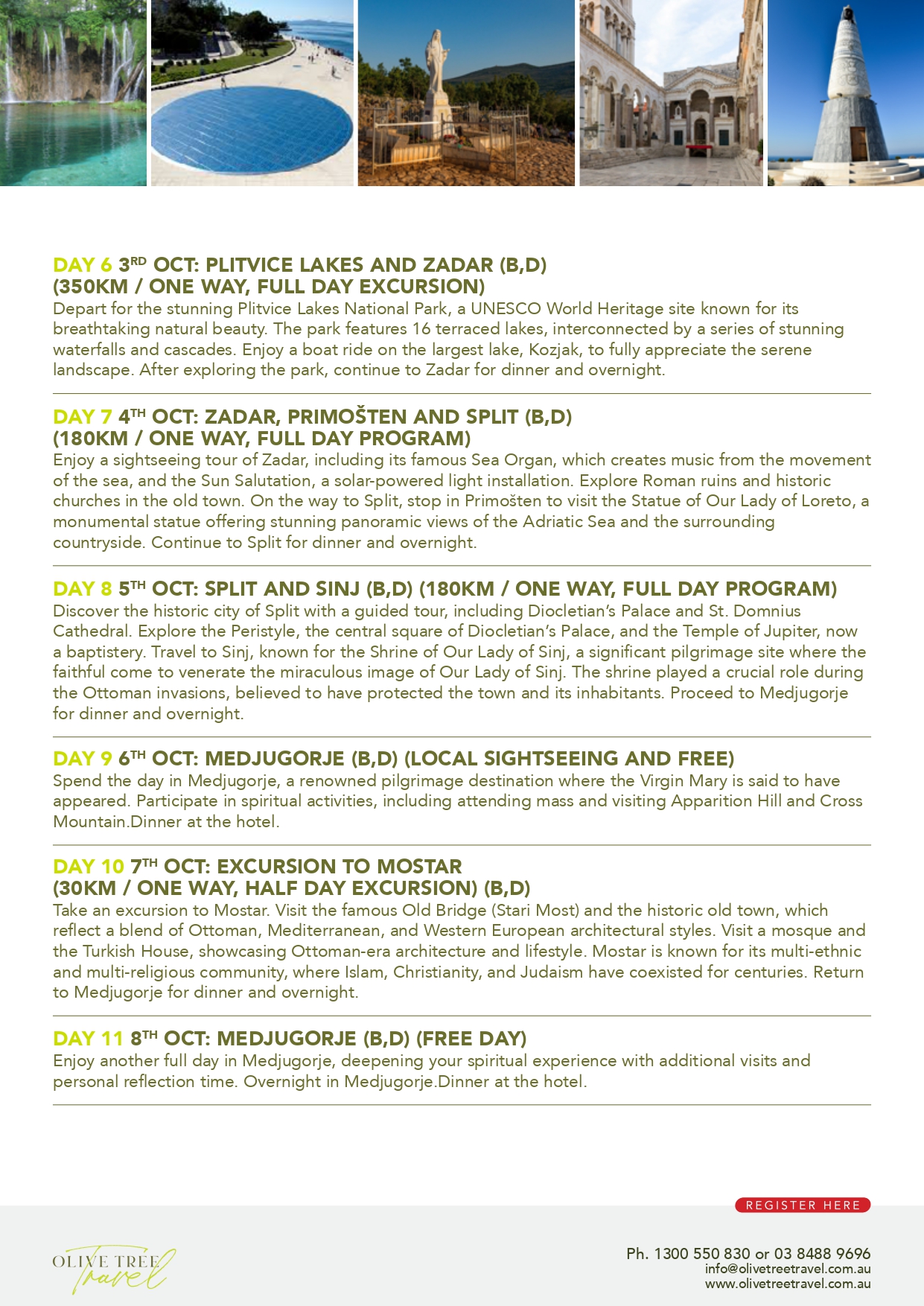

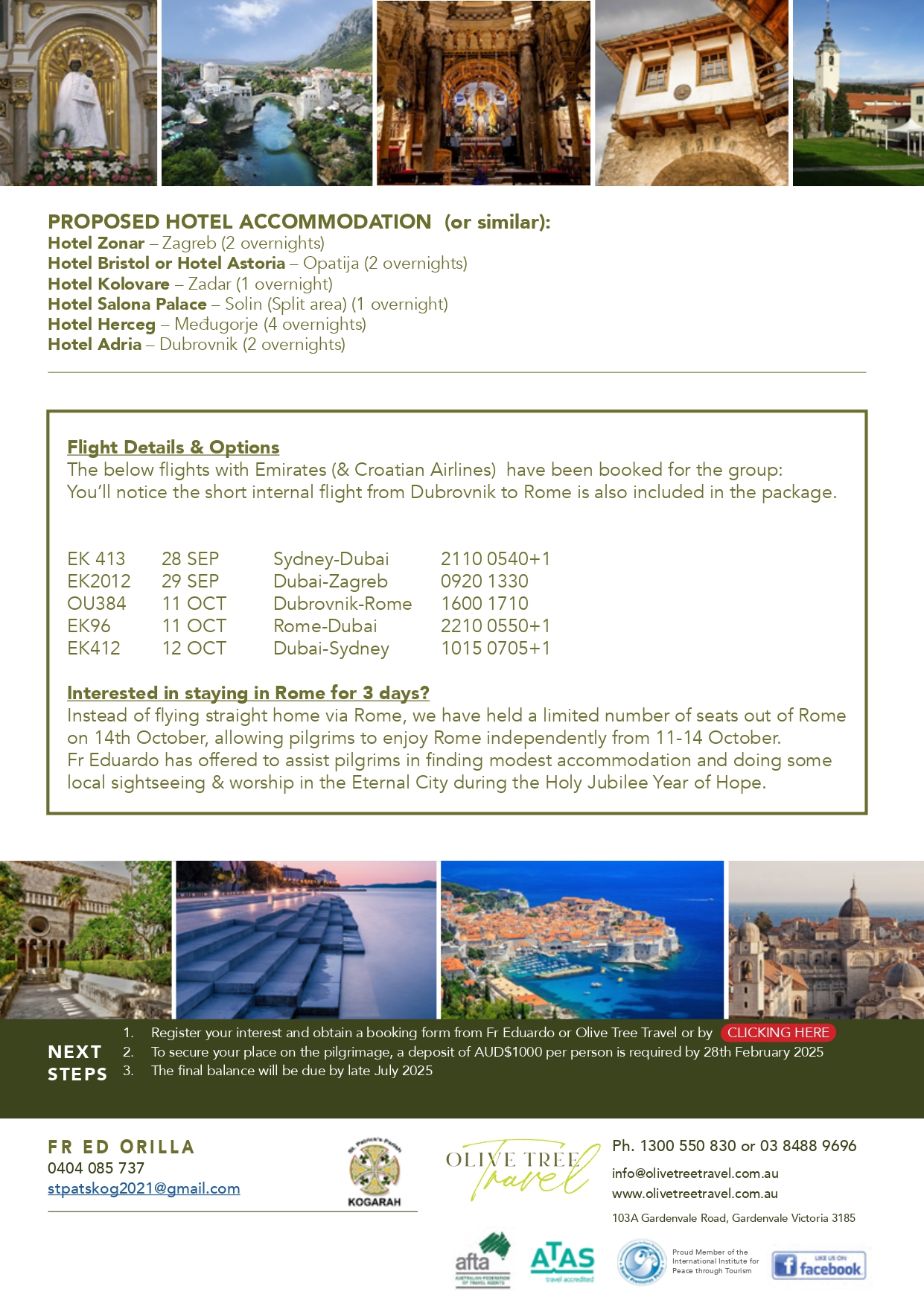




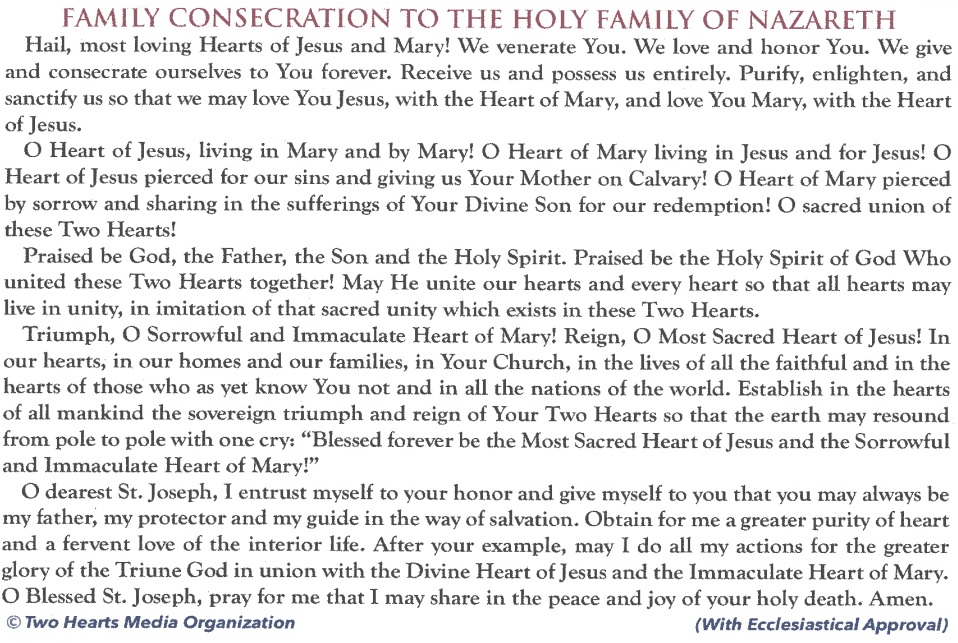

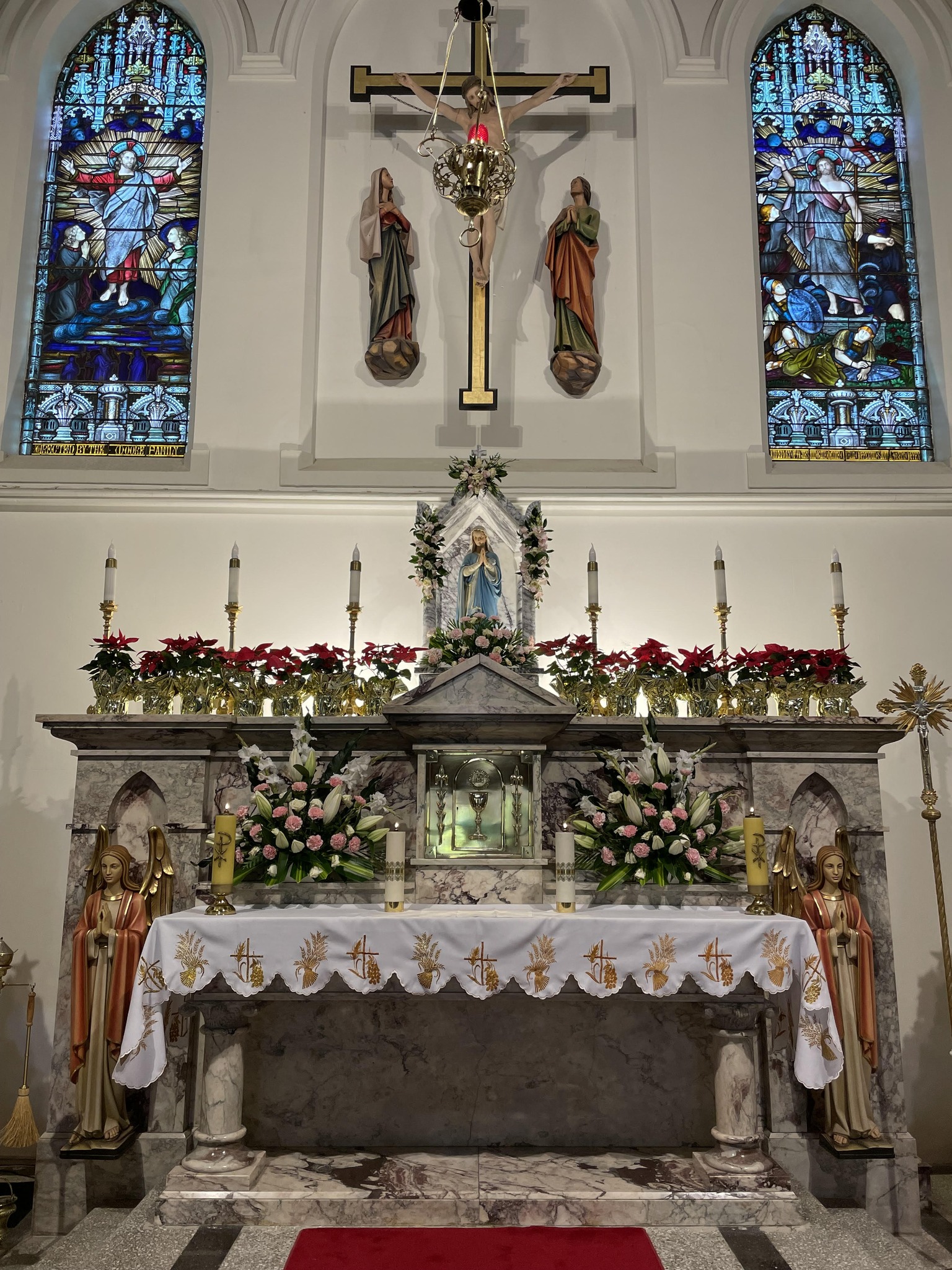
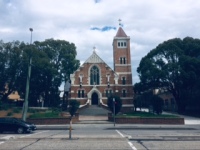


.jpg)

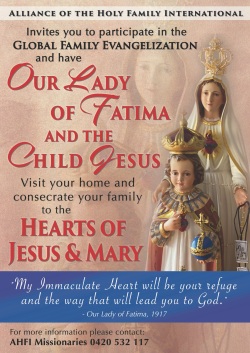
.jpg)




